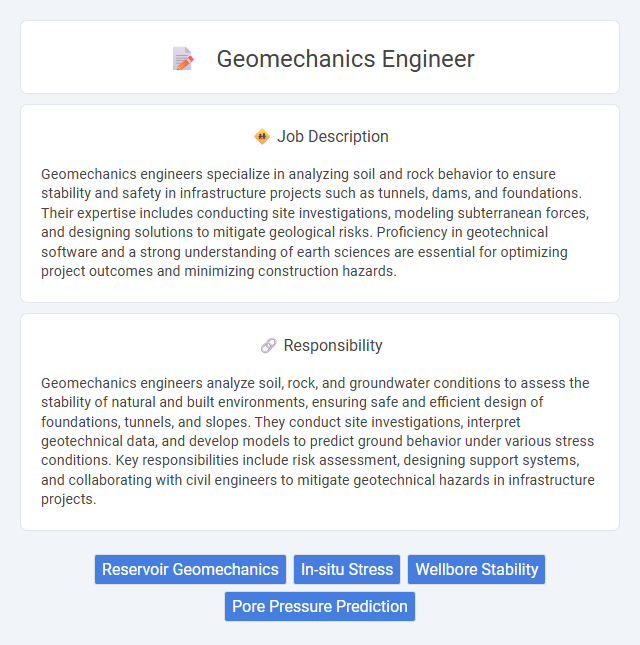
Geomechanics engineers specialize in analyzing soil and rock behavior to ensure stability and safety in infrastructure projects such as tunnels, dams, and foundations. Their expertise includes conducting site investigations, modeling subterranean forces, and designing solutions to mitigate geological risks. Proficiency in geotechnical software and a strong understanding of earth sciences are essential for optimizing project outcomes and minimizing construction hazards.
Individuals with strong analytical skills and a passion for earth sciences are likely to find a career in geomechanics engineering suitable and fulfilling. Those who enjoy solving complex problems related to soil, rock, and underground structures may be well-matched to the demands of the job. Candidates who prefer hands-on fieldwork combined with advanced technical analysis probably have a higher chance of thriving in this role.
Qualification
A Geomechanics engineer typically requires a bachelor's degree in civil engineering, geotechnical engineering, or a related field, with many positions favoring a master's degree for advanced expertise. Proficiency in soil mechanics, rock mechanics, and foundation design is essential, alongside strong analytical skills and experience with geotechnical software such as PLAXIS and GeoStudio. Professional certifications like the Professional Engineer (PE) license can significantly enhance career prospects in this specialized discipline.
Responsibility
Geomechanics engineers analyze soil, rock, and groundwater conditions to assess the stability of natural and built environments, ensuring safe and efficient design of foundations, tunnels, and slopes. They conduct site investigations, interpret geotechnical data, and develop models to predict ground behavior under various stress conditions. Key responsibilities include risk assessment, designing support systems, and collaborating with civil engineers to mitigate geotechnical hazards in infrastructure projects.
Benefit
A Geomechanics engineer likely benefits from a specialized role that offers opportunities to work on critical infrastructure projects involving soil and rock behavior analysis. The position probably provides competitive salaries and benefits due to the high demand for expertise in construction, mining, and environmental sectors. Career advancement and skill development in advanced modeling and risk assessment techniques might be common advantages in this field.
Challenge
Geomechanics engineers likely face complex challenges involving the analysis of soil and rock behavior under various conditions, which requires advanced problem-solving skills. The probability of encountering unexpected subsurface conditions means they must adapt their models and designs to ensure structural safety and stability. Managing the risks associated with natural hazards such as landslides or earthquakes may also pose ongoing difficulties in their work.
Career Advancement
Geomechanics engineers specializing in soil and rock behavior increasingly leverage advanced simulation software and machine learning to enhance predictive models, driving innovation in construction and environmental projects. Progression to senior roles often involves mastering multidisciplinary expertise, including geotechnical design, risk analysis, and project management, facilitating leadership in large-scale infrastructure developments. Continuous professional development through certifications such as the Professional Engineer (PE) license and participation in industry organizations accelerates career advancement opportunities within engineering firms and consulting agencies.
Key Terms
Reservoir Geomechanics
Reservoir Geomechanics engineers specialize in analyzing the mechanical behavior of subsurface rock formations to optimize hydrocarbon extraction and ensure wellbore stability. They integrate data from seismic surveys, well logs, and core samples to model stress distributions and predict fracture propagation within reservoirs. Expertise in geomechanical modeling software and understanding coupled fluid-rock interactions are essential for enhancing reservoir management and mitigating geohazards.
In-situ Stress
A Geomechanics engineer specializing in In-situ Stress analyzes the natural stress state within rock formations to optimize drilling and excavation processes. Accurate measurement and modeling of in-situ stress are critical for predicting fracture initiation, wellbore stability, and reservoir behavior under various loads. Expertise in geophysical data interpretation and numerical simulation tools ensures safe and efficient design in oil and gas, mining, and civil engineering projects.
Wellbore Stability
Geomechanics engineers specializing in wellbore stability analyze rock mechanics and in-situ stress conditions to optimize drilling operations and prevent wellbore collapse or fracturing. They employ advanced modeling software to simulate stress distribution around the wellbore, ensuring integrity under varying pressure regimes. Expertise in pore pressure prediction, rock strength evaluation, and drilling fluid formulation is critical to maintaining wellbore stability in complex subsurface environments.
Pore Pressure Prediction
Geomechanics engineers specializing in pore pressure prediction analyze subsurface stress and fluid pressure conditions to ensure safe and efficient drilling operations. Advanced modeling techniques and real-time data integration enable accurate forecasts of pore pressure anomalies, reducing the risk of wellbore instability and blowouts. Expertise in rock mechanics, seismic interpretation, and reservoir characterization is essential for optimizing drilling design and enhancing hydrocarbon recovery.
 kuljobs.com
kuljobs.com